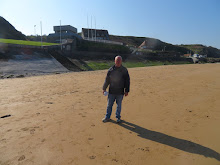My Grandmother wrote a weekly column for the local newspaper in the small town in Minnesota where she lived. During the early forties, everybody's young sons were overseas fighting either the Nazis or the Japanese empire, and both of Grandmother Gretch's two boys were so engaged, both Marines. Each of them saw heavy, desperate action, and she occasionally recorded her thoughts or her fears for their safety in her otherwise light-hearted column.
Her oldest son, my uncle Harry, a teenager when he enlisted, was an officer commanding the anti-aircraft batteries aboard a heavy cruiser with Halsey's Fifth Fleet. He earned the Bronze Star for meritorious service during a day of hellish combat of ships versus planes as he and a sister ship accompanied a gravely wounded aircraft carrier limping out of range of land-based aircraft at about three knots after a fast-carrier task force strike upon Tokyo the preceding day. The rest of the fleet sailed out of harm's way during the night.
Her youngest son, my father, a teenager when he enlisted, was a radioman at two of the most ferocious land battles in the Pacific. The brutality and bloodletting of the second one, Okinawa, is the reason why we dropped the atomic bomb on Japan to force it to surrender rather than face a projected million American casualties in an invasion of Japan. He was 20 years old when the war ended, a wisp of a deadly fighting man who tipped the scales at 120 pounds.
Here's how Grandmother Gretch, a keen observer, described troubled people coming spontaneously into church on June 6, 1944 to pray for the safety of their loved ones, most of whom were barely out of their teens. It starts off with her observation in the third person of an "older woman," who really was herself:
"Near us an older woman with a coat thrown over her house dress slipped to her knees and rested her head against the back of the next pew. She knelt for a long time, oblivious of the hymn, and her body sagged a little. It takes time to tell the Lord about her two sons in battle.
"Up ahead knelt a woman in a beautifully tailored suit and a hat that was perfection. Her hands clapsed and unclasped, clapsed and unclasped through the whole service. Her only son is in the thick of it.
"Two grave-faced fathers whose boys are in it, and dangerously, sat together and bowed their heads. A couple whose only son has just left these shores sat anxious-faced, and when they rose to sing their hands touched when they held the hymn book together.
"A very young bride whose husband is in it came in with her face white and her eyes frightened. Like a lost child she sat as close to her mother as she could. On her feet were frivolous, high-heeled scarlet slippers that one felt she had worn to keep up her morale. There is something very reassuring and gay about red slippers, even more so than a flowery new hat. A girl in a shabby gray coat sat stiffly upright and kept ducking her head to wipe her eyes. Both of her brothers are in Europe.
"Many people were there who had no sons in it, and they seemed anxious, compassionate. It was as though they were humbly eager to do what they could by the comfort of their presence and their prayers. A thing that shocked us was that we saw no young men between about 17 and 35. How blessed a thing it will be to have them back."
By Gretchen Leicht Lamberton, excerpted from "D-Day", appearing in Reflections and Recipes by the Casual Observer, Gretchen L. Lamberton, c1966 by the Leicht Press, Winona, Minnesota.
Subscribe to:
Post Comments (Atom)

No comments:
Post a Comment